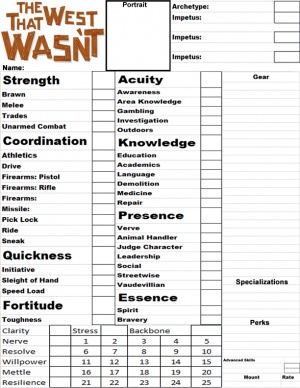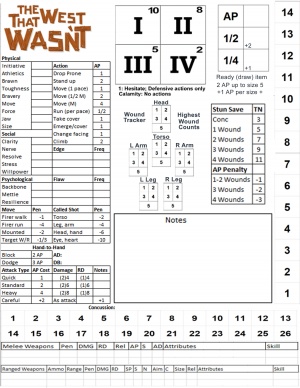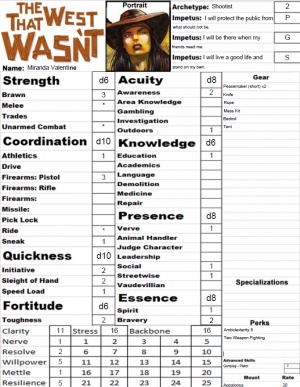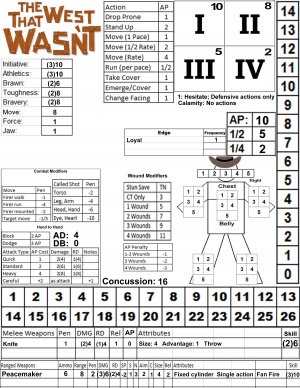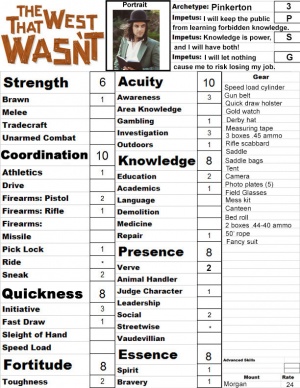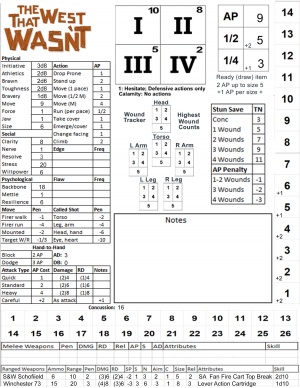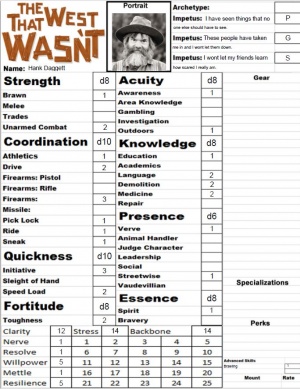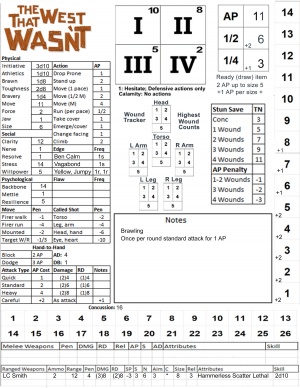The West That Wasnt - Anatomy of a Hero
Contents
Traits
Traits measure how well a character interacts with The West. There are 8 primary Traits in TWTW; 4 “physical” Traits and 4 “intangible.” These define the physical, perceptive and intellectual capabilities of the character. Each trait has a die type from d4 to d12. In TWTW, though dice are not rolled, the representations are present on the card so that players have an expectation of what results are likely within the given column. Action cards have columns that act like open ended (sometimes called exploding) dice of the given number of faces. See the Action Resolution and Conflict sections for more on using action cards.
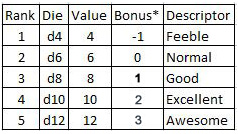
Each Trait has a Trait Skill that is used when no applicable skill exists. See Chapter 2.1, Skill List, for more on Trait Skills. Note that Trait Skills are only used when the skill does not exist, not when a character has no level in a given skill. Traits also have a Value, from 4 to 12, and a Bonus which is represented on the table above.
Traits determine the effectiveness of the interaction between a character and The West. A stronger character is better at interacting using Strength, such as when lifting a stone, swinging an ax or climbing a cliff face. Along with the 8 primary Traits assigned by the Player, there are 10 other attributes either derived from the values of the primary Traits, or that can be altered during character creation.
Physical Traits
The physical traits relate to the body of the character. What can the character do? Physical traits are easily measured or quantified.
Strength
Strength is a measure of physical power and ability to use it. Strength checks and tests are important when moving things, carrying things and when doing damage with melee weapons. The Strength trait determines how much a Hero can lift and carry (Chapter XX). Trait Skill: Brawn.
Coordination
Coordination is body control, physical precision and lithe deftness of a Hero. Some examples of coordination in action are firing ranged weapons, doing precise manual tasks quickly and agility. Trait Skill: Athletics.
Quickness
Quickness is the quick reactions and instantaneous movements of a Hero. The most common application of quickness is initiative during combat, but it can also be used with the Fast Draw skill, as well in other types of physical contests. Trait Skill: Initiative.
Fortitude
Fortitude is the physical toughness and pain threshold of the Hero. Fortitude is used in stun checks, as well as resisting disease and other effects of physical damage. Fortitude contributes to Concussion (below). Trait Skill: Toughness.
Intangible Traits
Intangible traits are much more difficult to measure. They constitute processes which are largely invisible to normal senses (or they are senses themselves!).
Acuity
Acuity is the mental alertness as well as mental aptitude of a Hero. Acuity is used when searching for something, as well as noticing something passively. Trait Skill: Awareness.
Knowledge
Knowledge is the sum of the education of the Hero as well as the application thereof. Knowledge is the basis for solving engineering and science problems, and also includes memory. Trait Skill: Education.
Presence
Presence is the will of the Hero as well as the ability to project that will into the world at large. Presence is used in initiating and resisting psychological contests (Chapter 6). Trait Skill: Verve.
Essence
Essence is that extra something that asserts itself in times of need. Essence is used for bravery, as well as for mystical abilities. Trait Skill: Spirit.
Attributes
There are three types of Attributes: Derived, Perks and Edges. Derived Attributes are based on other values such as Traits or a standard base. Perks are extra abilities some characters possess. Edges are differentiating factors that help or hinder characters in unique ways. Not all characters will have Perks and/or Edges.
Derived Physical Attributes
TWTW has 8 derived physical attributes.
Action Points
Action Points (AP) measure a characters skill during action time. Each potential action has a cost, and those are paid with AP. Characters begin the game with 8 AP plus the bonus value of Quickness.
Active Defense
This derived attribute determines how well a character can spot incoming attacks and how quickly they can move to avoid them. When a character takes a dodge action in combat, their Active Defense (AD) is added to the TN of all attacks. Active Defense is equal to the rank of the Initiative skill plus 1.
Concussion
Concussion (Conc) is a derived attribute that combines Fortitude and Essence trait values. This represents the amount of shock, fatigue, or trauma your character can take before keeling over. When Conc is reduced to zero or less the character is effectively out of the action. There may be circumstances when the Judge may allow limited actions, but in general, the Hero is down for the count. They neither check quickness nor draw cards during the combat phase. If forced to test a physical trait, the result is 0. Intangible traits are at Judge's discretion (but generally 4).
Damage Bonus
The Damage bonus (DB) is the extra damage a character does when using hand to hand weapons or attacks. Damage Bonus is equal to the Bonus value of the character's Brawn.
Force
The Force (F) value is used when attacking unarmed. It is compared to the Jaw value, as described in the combat section of the rules. Force is equal to 1 + the bonus value of Brawn, and is only used versus unarmored characters and those without cover. In cases of armor or cover, all characters have a penetration value of 0.
Jaw
Hand to Hand Armor value (J) is compared to F to determine whether a hand to hand attack penetrates. J is only usable versus unarmed attacks and blunt weapons, and is equal to the bonus value of Fortitude.
Move
Characters begin with a move of 8 paces plus the bonus value of Quickness. Movement up to half the move costs 2 AP. Movement up to the full value costs 4. Additional paces are 1 AP each. Running movement costs 2 AP up to the move, 1 AP thereafter.
One pace is approximately equal to one meter. Why not just say meter? It dont sound right sayin meter when talkin cowpoke!
Size
Size is the measure of how easily wounds are dealt to a character. When assessing damage, take one wound per multiple of size that in damage effect. To determine size, add the rank for the character’s Brawn and Toughness and consult the following table. Most characters will have a size of 6.
| Brawn + Toughness Rank | Size |
| 2-3 | 5 |
| 4-8 | 6 |
| 9-10 | 7 |
Derived Social Attributes
TWTW has five derived social attributes.
Clarity
Clarity is used in Social Combat to determine if an attack is misconstrued by the target. It functions as the Reliability (REL) value of a character's social combat attacks. Clarity is equal to 12 - (Social Combat skill level + 1 per specialization). This will yield a number between 3 and 12.
Nerve
Nerve is the character’s defense against fear, compulsion and other psychological attacks. Nerve is equal to the bonus value of the Essence trait. In Social Combat encounters, Nerve acts as the target's Armor Value.
Resolve
The Resolve value is used when making verbal attacks in a social combat encounter. It is compared to the Nerve value of the target as described in the Social Combat section of the rules. Resolve is equal to 1 + the bonus value of the Presence trait.
Stress
Stress is the measure of the character's mental wherewithal, and is used like Conc against psychological attacks. A character who is reduced to zero Stress is worn out. Stress is equal to the values of Presence plus Essence. More on psychological attacks and stress in chapter XX.
Willpower
Willpower is resistance to psychological effects in verbal or social engagements. It can be compared to the Size Attribute, above, but used against a different type of damage. Willpower is determined by adding the character’s Verve and Education rank and consulting the following table. Most characters will have a willpower of 6.
| Verve + Education Rank | Willpower |
| 2-3 | 5 |
| 4-8 | 6 |
| 9-10 | 7 |
Perks
Perks are special bonuses the character enjoys that are not effectively measured with other abilities. They may be due to background, social standing or practice.
Edges
Edges come in two varieties: Rough and Sharp. Rough edges are a character’s weaknesses, foibles, peculiarities or flaws. Sharp edges are benefits or talents that a character might have due to such things as upbringing, competence, or habits. Edges can be used to provide a differentiating factor that is not as broad as a Trait, or even a skill, but is “flavored” to how the character specifically interacts within the game world of The West. Mechanically, Edges all follow the same guidelines, but they allow players a chance to put some spin on how they benefit or challenge their character during play.
Creating Edges
Because edges are meant to quantify some factor of how this character interacts with The West, each Edge is potentially unique. The first step in creating an edge is giving it a descriptive name, such as Lawman, or Feminine Wiles. The next step is determining whether an edge is Rough or Sharp. Generally, Rough edges exchange in-game adversity for future growth (they gain the character experience points), while Sharp edges allow flexible mitigation of difficulty or increase in effectiveness.
Rough Edges
Rough edges can be voluntarily invoked by the player during the game before a card is drawn to resolve an action. If the TN of the given task is 5 or less, the player may invoke the rough edge to fail automatically. In exchange, the player earns an experience point. When a rough edge is invoked no other character may attempt this action.
Each character can earn an XP this way once per session. Additional XP can be earned by that character through use of other rough edges, though the XP go into the group pool (see Chapter XX for more on XP and the group pool) rather than directly to the character.
When appropriate, the Judge can also attempt to invoke a character’s rough edge to turn a success into a failure after the card is drawn. If the player accepts, 1 XP is placed into the group pool. If a player does not wish to accept, they may instead remove an XP from their personal pool, or, if empty, the group pool. Paying an XP in this manner allows the player to earn an additional XP from rough edges later in this session. The Judge should not invoke rough edges when a player has no personal XP and the group XP pool is empty, without Posse consent.
Sharp Edges
Sharp edges can be invoked by the player to increase the effect of any check. Regardless of what the edge is named, it can be used to affect any check the character is called upon to make. Of course, players are encouraged to use their edges for tasks that seem appropriate based on how they defined them, but this is not required.
Why is that? Players pay character points for an advantage, and that advantage should be relevant. In this way, characters always benefit from their advantages if the Player so chooses. There is no requirement for the Judge to find a way to allow a character to shine, and also, players are allowed the freedom to use their abilities creatively. Who is to say what advantages are gained through Feminine Wiles? Certainly not the authors of the game. The West is a vibrant place, and only those who are experiencing it truly know how each Edge can affect the world.
Sharp edges are purchased with a frequency rating. The frequency is how many times the edge can be used each game session.
When a sharp edge is invoked the bonus is +3. Because the Player has purchased the Edge with a limited number of uses, the Player may invoke any Sharp Edge on any check, no matter what the Edge is titled. The only restriction on Edge usage is that only one sharp edge can be utilized to affect a single check.
Skills
Skills determine the specific abilities and knowledge a character possesses. Skills are ranked from level 1 to 5. See Chapter 3.1, Skills, for how skills are used in game.
Skill Specializations
Some skills have associated specializations. When using the specialization for a skill, if the skill roll succeeds, the player earns one free Bump. (For more on Bumps, see Chapter XX: Skills)
Archetypes
Some players may wish to choose an archetype for their character. An archetype allows a player to collect some standard attributes and couple them with some special advantages to create a character that is familiar in some way. Characters who have an archetype have a background that grants them specific bonuses during play. These bonuses are directly related to the archetypal perception of Heroes of that ilk. In other words, academics excel at thinking and reasoning, and therefore learn related skills quickly.
One example of an archetype is a Soldier. Soldiers are trained to fight and use the tools of a fighter, be they guns, knives or clubs. Because they are well-versed in adapting in combat situations, a soldier who has never fired a cannon or Gatling-gun can likely figure it out quicker than some city slicker from New Jersey.
Each Archetype has 5 skills, or skill groups, and costs 12 points. Archetypes grant the following advantages:
1. All skills within the Archetype use the d6 column when used unskilled.
2. When purchasing or upgrading skills from a skill group with experience, if the skill group is in the Archetype and the Hero has at least one other skill within the group, all expenditures are reduced by 1, to a minimum of 1.
Each Archetype also has a unique skill similar to a Knowledge Skill, but broader. This skill is called the same thing as the Archetype itself, and is free to the Hero. The skill allows the Hero to know and do things that are specifically applicable to that Archetype. For example, a Bounty Hunter might know where to find wanted posters or how to collect on bounties, while a Lawman knows the local laws, criminals and stool pigeons, among other things. Anytime it is appropriate, the Judge can call for it to be used in place of another skill. The archetype skill uses the prime trait, and begins at a level equal to the trait skill.
Miranda Valentine is a gunslinger, and the Prime Trait for the Shootist archetype is coordination. When she uses her Shootist skill, she uses her 3d10 coordination, even if the usage is something that would not normally be related to coordination, such as knowing the caliber of a gun an opponent is using, or where to position herself for the best shooting angle. This may seem counter intuitive at first, but she is a great gunslinger primarily because of her coordination. Specialists often learn incredible amounts about the things that relate directly to their specialty, and they should utilize the trait that makes them great at what they do during the game when plying their craft.
Heroes may be created with multiple Archetypes, but each successive one after the first costs 4 points more than the previous one. So a Bounty Hunter who was once a Lawman must spend 28 points on Archetypes if all of the advantages of both Archetypes are to be retained.
Sample Archetypes
What follows are a collection of sample archetypes that are commonly found in The West. The list is by no means exhaustive, and players are encouraged to develop their own. All archetypes are subject to Judge discretion. They are meant as a means to bring to life elements of the classic western, not as a method of gaining free stuff through mechanics. In other words, archetypes should be straight out of the classic western, or something that is uniquely prevalent in your version of the west.
Each archetype has a description of some of the things that the archetype skill can do. It is by no means exhaustive, but should give players a good idea of what sorts of things can be done.
Cowboy
Cowboys are ranch hands that handle the day-to-day care of horses and other livestock. They also drive cattle across the plains to market, fresh pastures or other areas for sale.
Cost: 12
Prime Trait: Coordination
Skills: Animal Handler, Ride, Survival, Outdoors, Firearms
What can you do with the Cowboy archetype skill? Identify a ranch brand. Tie and use a lasso. Find a job at a ranch. Know who the players are in the local cattle industry.
Shootist
The shootist is the classic gunslinger of the old west. Bodyguard, hired gun, you name it. Shootists come from all walks of life, rough and tumble hombres to genteel city slickers.
Cost: 12
Prime Trait: Coordination
Skills: Firearms, Unarmed Combat, Melee, Speed Load, Fast Draw
What can you do with the Shootist skill? Get hired as a bodyguard. Find a spot for an ambush. Identify weapons and shell casings. Sweet talk local law enforcement.
Pinkerton
From tracking down runaway husbands to finding criminals, the Pinkertons did it all.
Cost: 12
Prime Trait: Acuity
Skills: Investigation, Social Combat, Ride, Firearms, Streetwise
What can you do with the Pinkerton skill? Question a suspect, subtly or directly. Schmooze with local law enforcement. Tail a suspect. Follow a trail. Bribe a madam.
Miner
People came west to strike it rich. Many of those, made, or lost, their fortunes in the mines.
Cost: 12
Prime Trait: Knowledge
Skills: Demolitions, Area Knowledge, Repair, Outdoors, Drive
What can you do with the Miner skill? Stake out a claim. Work with the assayer. Refine or pan for gold. Read a map.
Cavalryman
Many a young man began their adult lives in the army, and the cavalry was the destination for thousands of those.
Cost: 12
Prime Trait: Coordination
Skills: Melee, Ride, Firearms, Outdoors, Animal Handler
What can you do with the Cavalryman skill? Trick riding. Build a fort. Know the command structure of the local garrison. Pick the best horse.
Finishing Touches
After figuring out the nuts and bolts of the numbers that define your character and their abilities, you must decide on a bunch of other stuff that defines who your character is. Gotta have a name, of course. A gender. You'll want to figure out what kind of personality your character has. You may have considered this already, and chose your Traits, Skills and Edges based on that. You might have crunched the numbers first, and prefer to figure out what kind of a person would have the qualities you have chosen. You might blend the two methods. You should also have some kind of idea of your character's history, and where they came from. Depending on the story being crafted by the Judge, they may have some input or suggestions, so communication and collaboration is highly encouraged. Lastly, since the Judge is responsible for throwing a story your way that ought to entice your character to get involved in it, you will need to determine a few things that motivate your character into action. Each of these is called an impetus.
There are three different types of impetus: Posse, general and specific. The posse impetus is one that is shared by all the characters, and should be the same, or nearly so. The characters in the posse should be on the same side, and share some of the same views of the world; if characters were too diametrically opposed (one black hat in the middle of a posse of white hats, for example), it is likely that those types would not have stayed within the ranks of the group by this time. To determine a posse impetus, the players should all decide a common ideal or goal that all their characters share or could support. A general impetus could be considered a "code of conduct," or a considerable aspect of the character's personality or how they behave. A specific impetus is more like a set of values or a driving goal. Impetus is important because it helps your characters when they are partaking in actions that ought to be of particular interest to them:
- Posse Impetus: Whenever you fail a task when working toward your posse impetus, you add 1 XP to the group XP pool. Failure helps the group to grow and learn (and not be so sore if things don't always go their way!)
- General Impetus: When attempting a task that directly relates to your general impetus, it can be invoked to reduce the target TN by 1. This makes tasks that are of personal importance to your character a bit easier.
- Specific Impetus: When invoking this impetus, you may take the bonus counter any time you fail.
Once you have these details figured out, note down that your character starts with $125 (plus any extra from the edges Wealth and/or Windfall), reference the chapter on Gear and outfit your character. You should now be ready to play!
Anatomy of a Posse and Impetus
Our sample posse consists of three hombres, with very different, but compatible, backgrounds. Each of them has seen more than they wish, and knows that the mission of the DTI is vital to the well-being of those who will populate the frontier. Because this is a posse of DTI agents, they will all choose a posse impetus that reflects their mission.
Our first character is Miranda Valentine, a shootist who went out west because of her duty with the DTI. She chooses to phrase her impetus as follows: I will protect the public from things that should not be. She views her job as something akin to a parental duty. The public at large cannot know of the existence of the supernatural entities, and, moreover, those entities should not exist at all.
Next comes Cyril Wellington, a Pinkerton city-slicker turned DTI agent. He came west because of his DTI connection as well, but he has a very different motivation, which is clear in his impetus: I will keep the public from learning forbidden knowledge. To him, it is about the knowledge of the supernatural, and they should not learn anything of it. This is explored more, later, in his specific impetus.
Finally, Hank Daggett is our only member who is from the west, being born in Texas. His experience has changed who he was, and made him skittish and edgy. He does not want anyone else to experience this, so his impetus is: I have seen things no one else should have to see. His motivation is driven more by fear, than responsibility like Miranda, or authoritarian greed like Cyril.
Each character also has a general impetus. This is a broad statement about who the character is, like a code of conduct or moral compass. Again each of them distinguishes them self in their own direction with the content of this impetus.
Miranda grew up with the sting of abandonment, and so she vows that will never be who she is. Her general impetus is: I will be there when my friends need me. She has chosen who will be in her circle, and she will ensure that group remains safe. This cements her role as a parental figure, towards the public as well as her chosen family.
Cyril deepens his connection to the DTI mission with his impetus: I will let nothing cause me to risk losing my job. He is consumed by his job, which gives him purpose and forwards personal goals, which will be illustrated with his specific impetus, as well.
Hank projects a sense of community with his comrades via his general impetus: These folks have taken me in, and I wont let them down. He knows what it is like to be out there all alone, and now that he is not, he will do whatever it takes to keep his group intact.
The final impetus is a specific, something which is deeply personal to the character as a driving force.
Miranda states in plain and powerful language who she is inside with her specific impetus: I will stand on my own two feet and live a good life. Her fierce desire to be self-sufficient and pursue what is good (in her view) is what defines her. Combined with her other three statements, she is someone who prides herself on being reliable, capable and honorable.
Cyril rounds out his impetuses with a direct statement of why his job is such a driving force for him: Knowledge is power, and I will have both! His impetus set shows that he will simultaneously keep knowledge from the general public, while hoarding it for himself. This, he reckons, will lead to personal power that he desires.
Hank has seen too much, and he wants to be sure his compadres do not know how deeply that has affected him: I cant let my friends see how scared I am. This statement of both fear and shame illustrates why he acts the way he does and illustrates who he is as a person.
Note how all three characters in the posse have very different backgrounds and motivations behind their impetus, but each of them all point toward compatible goals. By having a party impetus that must be related to their job with the DTI, each character defines why being part of the story will be important to them. The posse impetus ensures that each member is strongly motivated to participate in the adventures to come.
Impetus Creation Guidelines
An impetus is a driving force for the character. As such, each impetus should be a strong, declarative statement about the characters behavior. The impetus should not only describe what their actions are likely to be, but also give insight into why those actions are chosen.
All of the impetuses from the sample characters are constructed either with "I will" or "I cant/wont". It is not required to use this exact structure, but using these constructs, especially for your first few characters, ensure an impetus that is strong and playable.
Sample Character: Miranda Valentine
Rumi wishes to create a gunslinger character whose past is riddled with abandonment, which leads her to be independent, but fiercely loyal to the friends she lets into her circle. She peruses the archetypes and decides that a Shootist would be the perfect fit for what she has in mind, so she selects that for 12 points.
Next she moves on to the five career skills for the archetype and assigns ranks to those. Before assigning levels to her skills she purchases her traits, selecting 2 at 10, 3 at 8 and 3 at 6. The 10s are assigned to coordination and quickness (coordination being the prime trait for her archetype), the 8s to Presence, Fortitude and Essence, and Strength, Acuity and Knowledge remain at 6.
For trait skills, she decides to upgrade Athletics and Initiative to 3, and Awareness, Strength and Toughness to 2. The others she leaves at 1.
For archetype skills, she decides to take all of them except Melee and Unarmed Combat, deciding that 2-6 is good enough if she runs out of bullets.
Looking at the advanced skills, she decides that she would like the Gunplay - Pistol skill at 3. This means she will need Firearms: Pistol at at least 3. She chooses level 3 in both. Finally, she takes one Sharp Edge, Loyal, so she can more effectively be there for her friends. Then she fills in the rest of the skills as follows:
Now all she needs is some gear and she is ready to journey to the west...
Sample Character: Cyril Wellington
Sometimes when you look too much, you see things you should not. And sometimes, the allure of what you should not know becomes a driving force in your life. Such is the case with Cyril Wellington. He became a Pinkerton because he was good at finding the truth: through conversation, science or other means. Growing up in New Jersey, and spending most of his early adulthood in New York, he is a new arrival in the west, but a greenhorn he is not.
He begins with traits, and spends 46 points to upgrade Quickness, Fortitude, Presence, Knowledge and Essence to 8, and Acuity and coordination to 10. Cyril has been a lot of places and done a lot of things, he is well rounded. Next 12 points are spent on the Pinkerton archetype. He raises the trait skills for acuity and quickness to 3, and knowledge, presence and fortitude to 2, for 16 points. Leaving 46 for skills.
He decides to buy the following skills: Firearms: Pistol and Rifle, Pick Lock, Sneak, Fast Draw, Gambling, Investigation, Outdoors, Academics, Repair, Social Combat, Judge Character and Bravery. He leaves both Streetwise and Ride to use his default from the Pinkerton archetype. He has two points remaining that he spends on windfall. During his time in the east he acquired more than just knowledge.
Sample Character: Hank Daggett
Hank was born on the frontier, in Texas, and heeded the siren's call of the gold rush when he was young. Once, during his travels, he came across a ghost town. He saw things he could not explain and the experience chilled him to his bones. Ever since, he has eked by on the fringes of society, and running scared. He has picked up a variety of skills in his travels, and a few peculiarities.
He begins with traits and spends 53 points. He upgrades Strength, Fortitude, Acuity, Knowledge and Essence to 8. Being a bit jumpy and skittish, he upgrades his coordination and quickness to 10. He tends to keep a low profile, so his Presence traits remains at 6. He raises the trait skill for coordination to 2, and raises Acuity, quickness and Fortitude to 3 (the better to notice danger and get the jump on or away from it, and to stay alive if he fails to do either!) Hank also increases his move by 3 to 11 for 6 points, to help him get out of trouble if he needs it.
Hank has developed the sharp edges of Beneficent Calm (x2) to help still his jangled nerves when he needs to come through in the clinch, and Vagabond (x2), to represent his varied knowledge over the years that might come in handy. He also has the rough edges Yellow-Bellied and Jumpy (both x1) due to the horrors he has seen in his travels. It may make him a bit less reliable at times, but that which doesn't manage to kill you makes you stronger, right? He also takes the perk Windfall for a bit extra starting money. This all costs 12 points, leaving him 60 points for skills.
Hank's player opts not to choose an archetype, imagining Hank as a sort of "Jack-of-all-trades," and uses the points he might have spent on an archetype on additional skills and skill levels. He chooses the following skills: Unarmed (with the advanced skill of brawling), drive, firearms (shotgun, with a specialization in snap shots), ride, sneak, pick lock, sleight of hand, speed load, outdoors, language (Sioux and Spanish, speak only), demolitions, medicine and streetwise. Seeing that neither Miranda or Cyril have taken it, Hank's player decides that sometime in his past, Hank might have learned a thing or two from a sawbones, and takes the medicine skill, as well, so he can be the group's "doctor," even though he probably won't be very good at it with only 8 in Knowledge.
